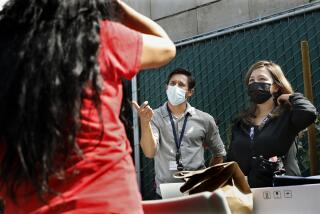Drug Stereotype Plagues Colombians in L.A.
- Share via
Some members of the Colombian community recall how seven years ago their country’s presidential elections were festively celebrated at their Los Angeles Consulate. Luis Carlos Galan carried Los Angeles, but Belisario Betancur won the overall tally.
However, the air was far from festive Aug. 30 as 300 Colombians assembled in St. Basil Catholic Church to pray for peace in their country. Their faces reflected their worry over the consequences of the death of Galan, who was assassinated by drug traffickers when he emerged as a favorite to win next year’s presidential elections.
“Today our country shows its nobility by rejecting and combatting violence, the result of foreign inducements, on fields sown with weakness and poverty,” said Helena de Cruz, the Colombian vice consul in Los Angeles.
Cruz’s short talk before the religious service referred to the critical situation in Colombia. In the South American nation, drug lords declared all-out war upon the Colombian nation after the government launched its aggressive pursuit of the kingpins and put into effect its extradition treaty with the United States.
The vice consul, as well as other prominent members of the Colombian community, blamed both drug traffickers and the media for having tarnished the image of Colombians in the United States, including 80,000 who live in the Southland.
“We are Colombians. We were born as such, and as such we make our way through life. That pride is not weakened even by the waves of misinformation that magnify the blemishes and minimize the virtues,” Colombian Consul Ana Lucia Solana said during a private cocktail party in Los Angeles in July to celebrate the 179th anniversary of her country’s independence.
She also had touched on this subject at the Paisa Festival in Whittier Narrows Park when she addressed 4,000 Colombians. It was the community’s annual independence day outing, also featuring frenzied dancing of cumbias, singing of their national anthem and shouts of “Viva Colombia!”
“It’s not easy to break away from this negative image when the press publishes things like ‘4,000 Colombians transform Los Angeles into the cocaine capital of the world,’ ” said Dukardo Hine-strosa, director of Circulo Cultural Colombiano, an organization that publishes books, organizes cultural events and is responsible for the annual Colombian independence festival.
“It is annoying to be identified only with drugs. The stereotype is constant and unavoidable,” said Paola Laverde, assignments assistant for KVEA-TV (Channel 52) news programs. “It shows up in someone’s innocent witticism . . . or in the malice of someone who means to insult one.”
“No one denies that there is Colombian involvement in drug trafficking,” said Adriana Saenz, an independent television producer, “but it hurts me to see that the amount of blood we Colombians have shed in the fight against drugs is not taken into account. There have been many judges, journalists and members of law enforcement who have died trying to keep drugs from entering this country.”
According to Douglas Montgomery, director of Colombia’s Trade Office in Los Angeles, the stereotype interferes with commerce between Colombia and California. “No perishable goods, like fresh fruit, can be brought in because they could spoil during the (customs) inspection process.”
But Colombia has not been identified always with the drug trade. “In 1946 when I arrived in Los Angeles, Colombia was unknown,” said Clara Munoz de Yust, former Colombian consul in Los Angeles. “At that time there were 102 Colombians, including my mother, my sister and me. There were few of us. We all knew one another.”
In the 1950s, the Colombian community grew with the arrival of students to attend local universities. Some, such as Carlos Badel, made California their home. Badel founded the Colombian Medical Assn. of Los Angeles.
On July 25, 1958, Colombian Luz Marina Zuluaga won the Miss Universe title in Long Beach. Colombians living in Los Angeles were deliriously happy, and the Colombian Social Center celebrated the event with a gala ball at the Beverly Hilton.
During that 1960s, Los Angeles received another wave of immigration from Colombia, described by Hinestrosa as consisting of professionals and skilled workers. The Colombian community was known to be concentrated in two cities: Pasadena and Long Beach. Today, it is spread throughout Southern California.
But distance is not the only factor that has caused Colombians to isolate themselves from their fellow countrymen. They seem to have unconsciously separated themselves into old-time residents and recent arrivals.
The long-term residents have tended to congregate in social clubs that support charity programs in Colombia, such as Nuevos Ideales (New Ideals) and La Fundacion Minuto de Dios (The Minute of God Foundation).
The newcomers, among whom many are undocumented aliens, are looked upon with a measure of distrust by the former group. “The drug problem forces people to be cautious about choosing acquaintances. Colombians are very distrustful, and the rigid social class structure influences how members of the community deal with one another,” said Jacqui Diaz, an executive of the Coronado Communications public relations firm.
Yet Dr. Gloria Olarte, a plastic surgeon, says that despite their isolation, Colombians tend to succeed when they join forces. “When something really big has happened, the community has joined together in a remarkable way.” She cited as an example the reactions to the destruction of Armero by a volcano.
“The bad reputation has branded us in the same way as Col. Aureliano Buendia’s 17 children were branded after that fateful Ash Wednesday: with an indelible cross on the forehead,” said Hinestrosa, remembering a passage from “One Hundred Years of Solitude,” a novel by Colombian Nobel Laureate Gabriel Garcia Marquez. “But, unlike the Buendias, we deserve a second chance on this Earth.”
More to Read
Sign up for Essential California
The most important California stories and recommendations in your inbox every morning.
You may occasionally receive promotional content from the Los Angeles Times.













